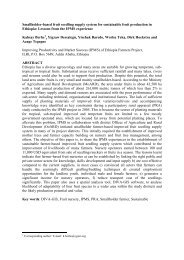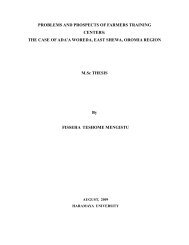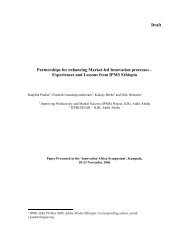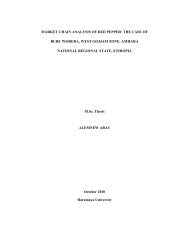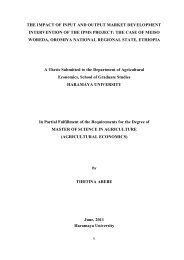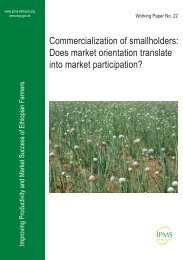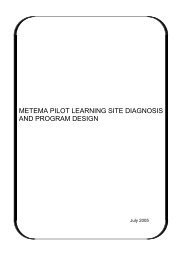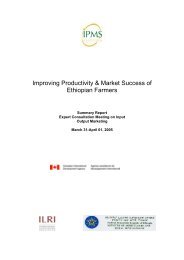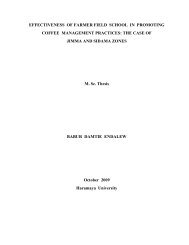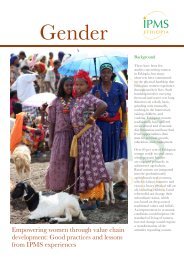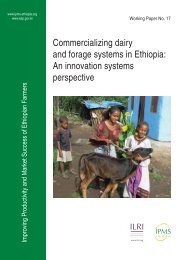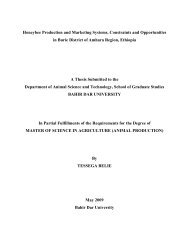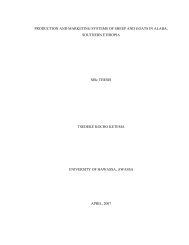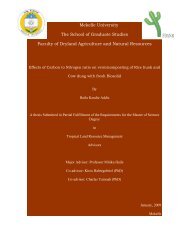effectiveness of modular training at farmers - IPMS Information ...
effectiveness of modular training at farmers - IPMS Information ...
effectiveness of modular training at farmers - IPMS Information ...
You also want an ePaper? Increase the reach of your titles
YUMPU automatically turns print PDFs into web optimized ePapers that Google loves.
Table 8: Knowledge test <strong>of</strong> sample householdsRespondents N Mean SD t- value p-valueTrained 60 17.38 3.11 2.952*** 0 .004Untrained 60 15.82 2.69Source: Own survey d<strong>at</strong>a (2010)***Significant <strong>at</strong> 1 % probability levelThe t-test shows th<strong>at</strong> there was high significant (p< 0. 01) difference between mean scores <strong>of</strong>trained and untrained <strong>farmers</strong> (probability p= 0.004). Knowledge test indic<strong>at</strong>es th<strong>at</strong> the trained<strong>farmers</strong> had better level <strong>of</strong> knowledge than untrained <strong>farmers</strong>. The d<strong>at</strong>a reported in Table 8,clearly indic<strong>at</strong>ed th<strong>at</strong> there was high significant difference between mean scores <strong>of</strong> knowledge<strong>of</strong> two groups <strong>of</strong> <strong>farmers</strong> with respect to <strong>modular</strong> <strong>training</strong> on selected practices. The trained<strong>farmers</strong> gained more knowledge as compared to untrained <strong>farmers</strong>. About 41.7% and 56.7%<strong>of</strong> the trained respondents had acquired medium to high level <strong>of</strong> knowledge respectively,while 70.0% and 30.0% <strong>of</strong> the untrained <strong>farmers</strong> had acquired medium to high level <strong>of</strong>knowledge <strong>of</strong> the same practices (see Appendix Table 1).However, untrained <strong>farmers</strong> also know something about apiculture, dairy and f<strong>at</strong>teningpractices due to knowledge and inform<strong>at</strong>ion sharing, different extension activities conductedin the locality, informal discussion with trained <strong>farmers</strong> and from their life experience. Butfrom the result obtained, it could be seen th<strong>at</strong> <strong>modular</strong> <strong>training</strong> kept the <strong>farmers</strong> moreknowledgeable in promoting those commodities, especially with reference to beekeeping anddairy. The results <strong>of</strong> the study are in line with the findings <strong>of</strong> Babur (2009), who reported th<strong>at</strong>knowledge <strong>of</strong> c<strong>of</strong>fee management practices <strong>of</strong> members <strong>of</strong> Farmer Field School was higherthan the non members. Although the <strong>training</strong> content differs, these findings can agree withthe findings <strong>of</strong> Kefyalew (2006) and Tsion (2008) th<strong>at</strong> <strong>training</strong>s kept the trained <strong>farmers</strong> moreinformed and acquired knowledge.49



